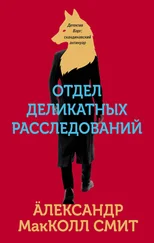‘It is very good for the digestion,’ said Mr Sengupta.
‘And for many other organs,’ said Miss Rose. ‘It clears the head and the nasal passages.’
‘Yes,’ said Mma Ramotswe. ‘Tea does all of those things. And more, I believe. And yet people still drink coffee…’
Mr Sengupta started to shake his head. First it went from side to side, over one shoulder and then over the other, but then it started to move backwards and forwards. The signals confused Mma Ramotswe; she knew the Indian habit of moving the head from side to side meant the opposite of what it meant elsewhere and signified approval rather than disagreement, but she was not sure what a combination of movements meant. Perhaps there was something wrong with Mr Sengupta; perhaps his head was loose.
‘I am in complete agreement with you, Mma,’ he said. ‘There is too much coffee being drunk. It is a serious situation.’ He paused. ‘But that is not the problem that I wanted to talk to you about. I am happy to talk about coffee some other time, but there is another thing that is preying on my mind.’
‘Then please tell me, Rra.’
‘I shall. But firstly, may I tell you about myself, Mma Ramotswe?’
‘And me too,’ said Miss Rose.
‘Yes, yes, I’ll tell them about you, Rosie. But I shall be first because I am the one who is speaking, you see.’
‘Do you know India, Mma?’
In the background, the kettle, supervised by Mma Makutsi, began to make sounds of readiness – a faint whistling, like the first stirrings of the wind.
‘I’m afraid I don’t, Rra. There are many places in this world that I would like to see one day, and India is certainly one of them. It is high on my list.’ As she spoke, Mma Ramotswe reflected on the fact that she had never really been anywhere much, apart from a couple of trips over the border into South Africa, and on another occasion north to Bulawayo. That made a total of two foreign countries, but she did not think of Botswana’s neighbours as being really very foreign. And as for the list, it was hardly an active one, as she suspected that she would never be able to get away, even if she could afford the fare, and somebody would have to take care of Mr J. L. B. Matekoni and the children. And if Mma Makutsi were left in charge of the No. 1 Ladies’ Detective Agency there was always a risk that she would do something that would require sorting out later, co-director or not. Then there was another thing: even if India was on her list, there were other places that were higher up. There was Muncie, Indiana, to which Clovis Andersen, author of her vade mecum , The Principles of Private Detection , had given her an open invitation before he left Botswana; and then there was London, which she would like to visit in order to see Prince Charles if at all possible, although she was realistic about that and realised that he could well be busy when she was there and unable to fit her in to talk about the things that she had read he liked to talk about. She would like it if they could exchange notes on gardening, and she could tell him about her success with runner beans and her mopipi tree, and the difficulties of growing things when the rains were achingly slow to arrive. He would understand all that, she thought, because he had been to Botswana and had gone out into the Kalahari and she could tell that he knew; and she could see that he was a good man.
Mr Sengupta was saying something about Calcutta. ‘My family is from Bengal, you see, Mma. Perhaps you know of Kolkata, which they used to call Calcutta. I still call it that because I cannot keep up with all the changes in the world. Change this, change that – who are these people who tell us we must always be changing, Mma Ramotswe?’
Both he and Miss Rose looked at Mma Ramotswe enquiringly, as if the question were not rhetorical, but demanded an answer. Mma Ramotswe was not sure what to say; she agreed with the general sentiment, though. ‘They are tiresome people, Rra,’ she said. ‘You are right about that.’
‘But who are they?’ repeated Mr Sengupta.
Mma Ramotswe shrugged. ‘They are people who write in the newspapers or talk on the radio. They are the people who keep telling us what to think and to say.’
Mr Sengupta leaned forward in his enthusiasm. ‘Exactly, Mma! Exactly! I do not ever remember any election in which I was asked to vote for people for the job – the job of telling others what they can say and what they can’t say. Do you remember that election?’
Mma Makutsi had now made the tea and was passing a cup to Miss Rose. ‘There was no election like that,’ she contributed. ‘These are people with very long noses, that is all.’
Mr Sengupta turned to look at her. ‘Long noses, Mma?’
‘Yes, they have long noses because they poke them into other people’s business. That is why they think they can tell us what to say.’
‘I tell them to go away,’ said Miss Rose. ‘I say: go away, you people, just go away.’
This remark was greeted with silence. Then Mr Sengupta continued, ‘We should be more prepared to tell people to go away, you know. If more of us stood up and said “go away” we would have less trouble with government people and busybodies of every sort.’
‘That would teach them,’ said Miss Rose.
‘But I must get back to what I was saying,’ said Mr Sengupta. ‘As I was telling you, my family is from Bengal. My grandfather was a well-known man in Calcutta. He had a street named after him, you know, and he was very well off before he lost all his money in some political dealings with some very rotten fellows. That was a big tragedy for our family, but my father picked himself up and treated it as a challenge. He became a successful man and was able to give each of his four sons enough money to go and start a business somewhere. That is when I came to Botswana – that was thirty years ago. I was twenty-five then, Mma. I was young, but I came and started my office supplies business. It was not easy leaving India and starting up in the middle of Africa, but I did it, Mma. And the moment I arrived in this country I thought: this is a good place. This is a good place because people treat one another well and there is much work to be done. That is what I thought, Mma, and I have not changed my view.’
Mma Makutsi passed Mr Sengupta his cup of tea and he thanked her with one of his difficult-to-interpret movements of the head. ‘Then my sister came and joined us with her husband. He worked with me in the business, and started our branch up in Francistown. That did very well until he became ill and subsequently he passed over.’ He looked at his sister, who lowered her eyes.
‘I am glad that everything went well for you, Rra,’ said Mma Ramotswe. ‘But I am sorry about your husband, Mma. I am sorry that he is late.’
Miss Rose raised her eyes and acknowledged the expression of sympathy.
‘We lead a quiet life,’ said Mr Sengupta. ‘We are both citizens now – I took citizenship fifteen years ago, and I am very proud of it. My sister took it a bit later, but she is also proud to be a citizen.’
‘I am happy to hear that,’ said Mma Ramotswe. She was not sure where the story was going. Mr Sengupta had said that he was leading a quiet life, but not so quiet, it seemed, that he had no need to consult the No. 1 Ladies’ Detective Agency.
Mr Sengupta suddenly looked grave. ‘Then something happened,’ he said. ‘Something very unexpected.’
They waited. For a full minute he sat in silence before continuing. ‘A woman came to our house,’ he said. ‘She was an Indian person, like us. She walked up to the house. We have a man at the gate. These days people like us have a man at the gate to watch out for people who think they can steal our possessions. They think that just because we are Indian we will have a lot of money and they can come and help themselves to it.’
Читать дальше
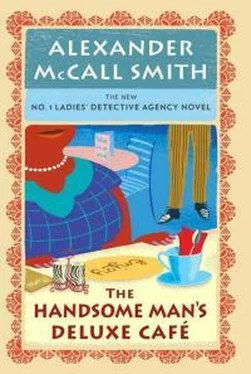


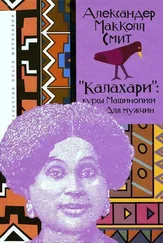
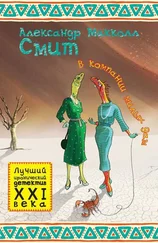
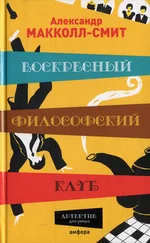

![Александр Макколл Смит - Отдел деликатных расследований [litres]](/books/397661/aleksandr-makkoll-smit-otdel-delikatnyh-rassledova-thumb.webp)
